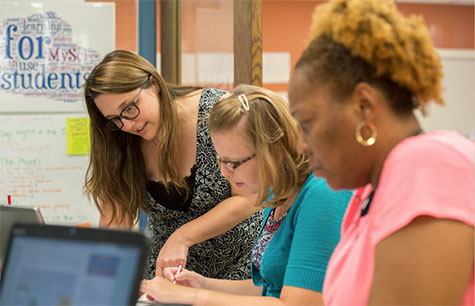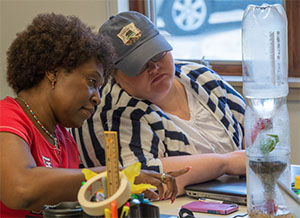
The Institute for School Partnership (ISP) at Washington University in St. Louis has partnered once again with the Monsanto Fund to bring high quality science education to students in St. Louis through its MySci program.
The Monsanto Fund awarded the ISP with a $1,935,000 grant, beginning July 1, 2015. Over the three-year grant period, the ISP will create a hands-on, inquiry and project-based science curriculum for middle school students that integrates elements of science, technology, engineering and mathematics (STEM).
“Careers in STEM fields are growing,” said Deborah Patterson, president of the Monsanto Fund. “Extending the MySci program, which has been so successful with K-5 students, to include middle school will help prepare students to enter a world where STEM skills are essential.”
MySci launched in 2005 with a $3.7 million grant from the Monsanto Fund and a mission to cultivate the region’s next generation of scientists by engaging elementary students in STEM topics through interactive learning experiences and creative curriculum.
The Investigation Station was designed first with a set of three in-class units that engaged students in a fun and exciting way. This roving vehicle of innovative, hands-on exhibits and specimens made learning fun as students crawled through and explored three zones in the 37-foot custom-built trailer.

Comments from the students and educators who experienced the Investigation Station made it clear that MySci was striking the right chords when it came to science education.
“Our kids absolutely loved the Investigation Station,” said Annette Cook of Brentwood Early Childhood Center in the Brentwood School District. “The students and staff are still talking about it. What an amazing way to share science with children.”
Through significant support from the Monsanto Fund during the past three years, the MySci program has grown. The K-5 MySci curriculum met the needs of classroom teachers by filling a curriculum gap between engaging, hands-on science and content that met state education standards and prepared students for standardized testing. After three years, the MySci curriculum is now used in schools in up to 13 districts in St. Louis and the surrounding region.
However, ISP staff knew more work needed to be done to prepare the next generation of not only scientists, but also STEM professionals.
Research shows that there is a dramatic decrease of interest in the sciences during middle school years. Additionally, these grades are crucial to preparing students for the rigor of high school classes and advanced education.
Building on the success of MySci’s K-5 curriculum, the staff began developing curriculum for grades 6-8 during this summer of 2015. These modules will be project-based in nature, and will challenge students to connect science to real-world problems.
“Middle school is where students decide whether they will pursue a STEM career,” said Victoria May, executive director of ISP and assistant dean of Arts & Sciences.
“It is so important that science curriculum is engaging and allows students to envision themselves as problem solvers of the issues that our world faces today,” she said.